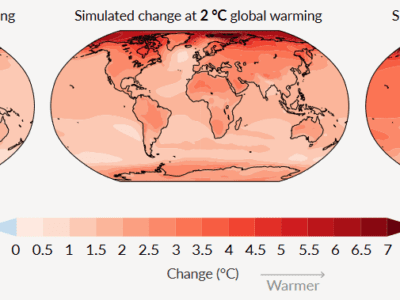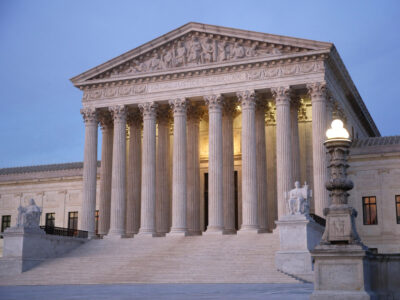Does the Constitution Exempt Churches from Social Distancing?
Short answer: “No.” And it might even be unconstitutional for states to grant such exemptions.
Most religious groups have willingly complied with public health limits on large gatherings. But not all. These claims of religious exemption, and some states’ responses to them, raise important constitutional issues.
There have been a couple of cases in the spotlight. Rodney Howard-Browne is a Florida preacher who prayed over Trump in the Oval Office in 2017. He refused to stop religious service and vowed not to stop services or discouraging his flock from shaking hands in greetings. (Last Thursday, he said he was discontinuing services due to a “tyrannical government.” But now he’s starting about starting again.) A Louisiana preacher, Tony Spell, was warned by police after holding a service with hundreds of followers, saying he wouldn’t allow “any dictator law” to interfere.
These two cases do not stand alone. Just last Sunday, at the Godspeak Calvary Chapel in Thousand Oaks, California, members of the congregation took communion. Their pastor had resigned from the city council as a prelude to violating the stay-at-home order. The church did implement social distancing, but California is past the point where such efforts are considered sufficient.
Religious rights advocates have filed lawsuits challenging restrictions on religious gatherings, and they are threatening to do so in the case of the California church. It seems unlikely that those legal efforts to win exemptions for churches will be successful.
Claims that churches are constitutionally entitled to exemptions run headlong into Supreme Court precedent. The Court has made it clear, in an opinion by none other than conservative icon Antonin Scalia, that religions are subject to the same general laws as everyone else. As Scalia’s observed, “We have never held that an individual’s religious beliefs excuse him from compliance with an otherwise valid law prohibiting conduct that the State is free to regulate.” In that case, the Court held that a church’s central sacrament (the use of peyote by a Native American group) is as much subject to drug laws as any other use of the drug.
A church service is also an exercise of freedom of speech and freedom of association. Social distancing rules can restrict those rights in the case of a church, just as they would in the case of political rally or a rock concert.
But none of those rights is absolute. In a 1991 opinion, the Court held that restriction on First Amendment rights are valid if they satisfy what’s called strict scrutiny. That means that that “the State must show that its regulation is necessary to serve a compelling state interest and is narrowly drawn to achieve that end.”
Arguably, that standard is too strict for a restriction on meetings during a pandemic. Since the ban on large groups does not relate to the content of speech or the purpose of a meeting there’s an argument that it should be subject to less rigorous review than this. And in an abortion case decided yesterday, conservative judges in the Fifth Circuit said settled law “allows the state to restrict, for example, one’s right to peaceably assemble, to publicly worship, to travel, and even to leave one’s home.” That court seemed more than willing to allow fundamental rights to be restricted. However, it’s not necessary to consider such less demanding constitutional tests. In a pandemic, a ban on all large gatherings should survive even strict scrutiny.
Combatting a serious epidemic — and even President Trump is now talking about a hundred thousand or more deaths — undoubtedly qualifies as a compelling state interest. Moreover, bans on large gatherings are as “narrowly drawn” as possible insofar as they apply to the churches, since they are limited to the time the epidemic continues. Louisiana pastor Tony Spell has argued that churches should be exempted if large stores like Walmart are exempted. But Walmart and other stores do not pack crowds close together, and they sell essential items like food and drugs. After all, a mega-church in California spawned 70 new cases, and who knows how many hundreds more were infected by those folks?
In fact, if a state bans other large gatherings such as concerts or music clubs, it is probably unconstitutional to exempt churches, as Florida Governor DeSantis has done. The Supreme Court has emphasized time and again that the government has no business giving higher value to some perspectives than others.Treating gatherings for religious speech as exempt, while banning gatherings for other types of speech, rests squarely on this impermissible desire to favor some kinds of speech over others.
In any event, the state’s power to ban religious gatherings as well as other gatherings like concerts or parades seems clear. It’s been said that the Constitution is not a suicide pact. It’s not likely that the Supreme Court, which currently believes it is unsafe for the nine Justices to meet, will forget that wisdom.
[An earlier version of this post mistakenly attributed the “suicide pact” remark to Justice Holmes.]
Reader Comments
6 Replies to “Does the Constitution Exempt Churches from Social Distancing?”
Comments are closed.







Justice Holmes never said that.
Thanks for the correction.
and why is this appearing on an environmental blog?
That’s a fair enough question. But we’ve covered other aspects of public health in the past. After public health is the foundation of the laws dealing with pollution and toxic substances. The coronavirus coverage is going beyond that, but after this, this is an exceptional situation.
Thank you for researching and posting. In further response to Mr. Schanpf, Professor Farber is also an expert in the emerging field of disaster law, of which this post is related. The intersectionality between environmental law and disaster law is obvious and does not bear further discussion. Thank you again.
The coronavirus is a dubious excuse to suspend civil rights guaranteed by the Bill of Rights. The “data” produced by governmental divisions used to justify the suspension of individual rights is highly suspect. The impact of the virus has not been as significant as government has reported. Those misleading data include reporting deaths as COVID when the more significant factors causing death are in fact heart disease, cancer, and other “co-morbidities.” Further, no one has definitively shown that going to church causes people to spread the virus in a significant way. It is not analogous to prohibiting someone’s yelling “fire” in a crowded theater, which would cause an immediate threat to and probably loss of many human lives. Finally, the Supreme Court has not justified the suspension of Constitutionally guaranteed rights for “protecting” citizens’ rights because of the incidence of heart disease or cancer, both of which dwarf the number of deaths from Covid-19.